.webp)
Learning how to mulch around trees can keep them healthy and help the rest of your landscaping to thrive. After all, nobody wants to come home to a property with trees that are dying or in decay. It’s not only depressing, but it can also have a negative impact on the curb appeal of your home. Unfortunately, one of the common mistakes many homeowners make when caring for their trees is placing too much or the wrong type of mulch around the tree base. This can not only affect the growth of your trees, it can kill them. Use this information from our landscape experts and learn how to mulch properly around your trees to keep them healthy and thriving throughout the year.
Table of Contents:
What is Mulching, and Why Is It Important for Trees?
Adding tree mulch is one of the best things you can do to help newly planted trees get better established in the landscape. So what is mulching? Mulching means you or a professional landscaper spreads or lays organic or inorganic material over the soil's surface. Covering the soil's surface with mulch conserves soil moisture. Since trees get all the nutrients they need from water, holding that moisture for trees is highly beneficial. Applying tree mulch to young trees is an excellent way to fertilize them with slow-release nutrition.
Adding mulch is beneficial to both new and established plants — mulch also regulates soil temperature to keep plants warm in the winter and cool in the summer. Plus, mulch can suppress weed invasions and looks attractive on garden beds and borders. On the downside, too much mulch can be detrimental to the health of your trees.
How Much Mulch Is Enough?
There's no denying the benefits of applying mulch around trees. However, improper mulching can adversely affect trees and plants. When spreading mulch around trees, try to aim for about 7 to 10 centimeters of mulch depth. Keep in mind that if the layer is too thick, it can restrict oxygen flow and suffocate the tree roots.
Over-mulching trees can lead to the following problems:
- Root suffocation (oxygen starvation).
- Inner bark death.
- Fungal and bacterial diseases.
- Excessive heat buildup around the base of the tree.
- Changes to the soil pH (You can avoid this problem by checking the soil pH regularly and rotating the type of mulch you're using.)
- Attract pests such as rodents.
- Cause a nitrogen deficiency.
Contact your local lawn care experts if you don't know how to mulch a tree or don't feel confident mulching trees. Professional landscapers have the experience and proper equipment, follow the best practices, and know the correct amount of mulch your trees require.
What Type of Mulch Is Best for Trees?
Mulch is available in two forms, organic and inorganic. Tree care experts prefer using organic materials, like wood chips, bark, pine needles, cocoa hulls, and leaves. Organic materials improve soil structure and increase soil fertility when they decompose. And while inorganic materials such as gravel, stone chips, river rocks, and rubber can suppress weeds, they don't decompose or provide trees with the same benefits.
The following are the pros and cons of various organic materials:
Wood Chips
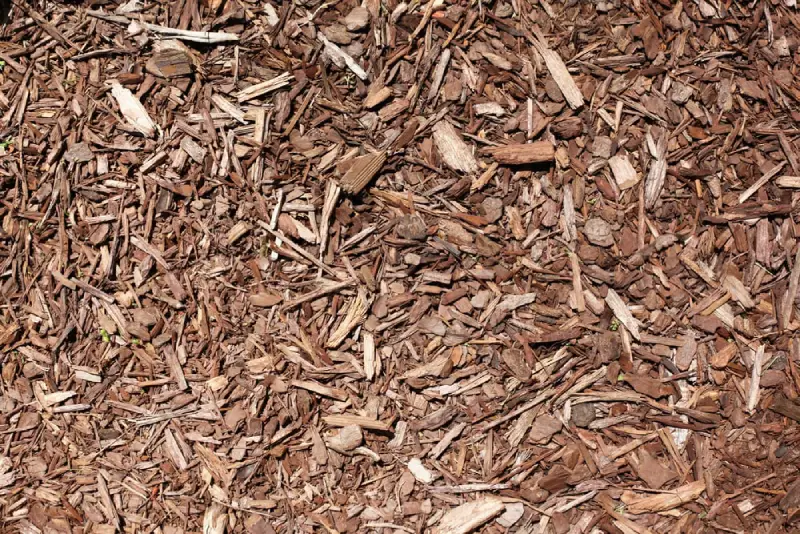
Pros: Cost-effective, easy to apply, looks great on the landscape.
Cons: Fire hazard, attract pests, may transfer diseases.
Bark
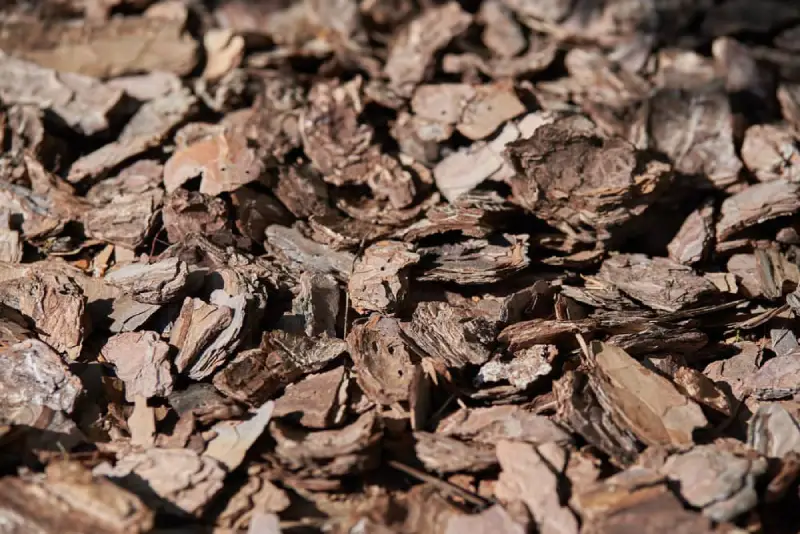
Pros: Cost-effective, easy to find, breaks down slowly, excellent for slopes.
Cons: It may decrease nitrogen content from the soil when it decomposes.
Pine Needles
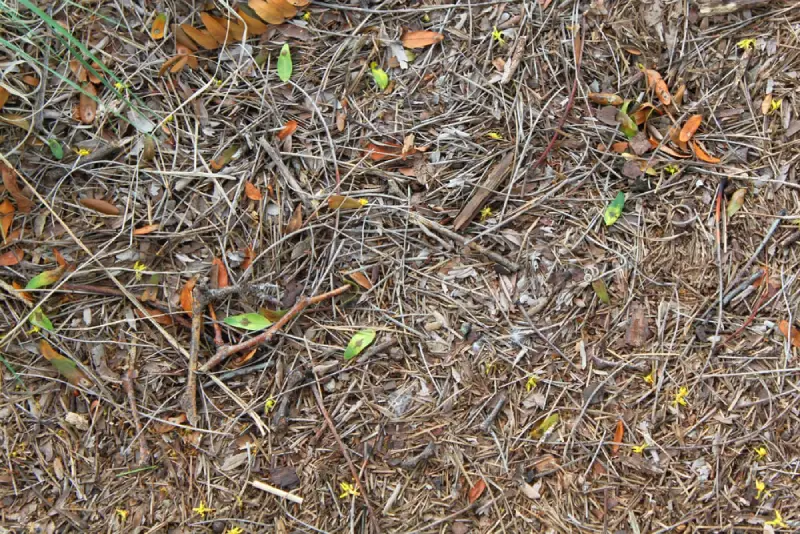
Pros: Breaks down slowly and stays in place. Fantastic at suppressing weeds.
Cons: May be hard to work with (prickly). Adds to soil acidification.
Cocoa Hulls
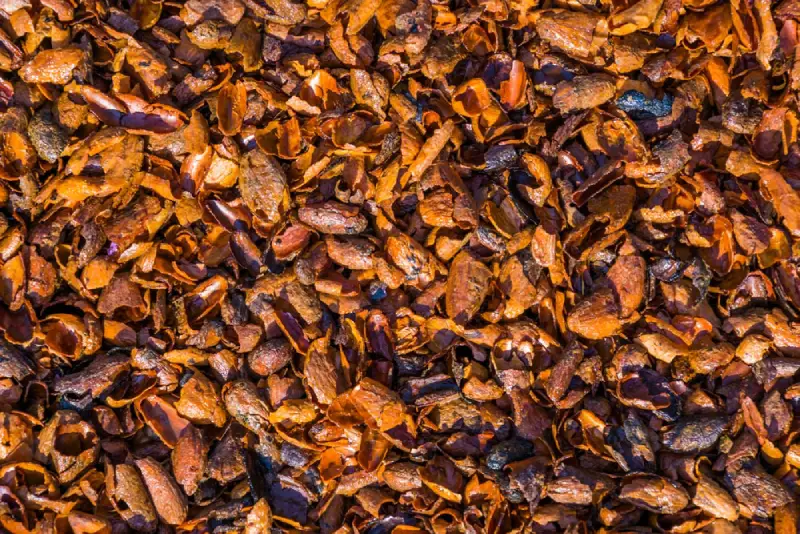
Pros: Excellent at retaining water and suppressing weeds. Improves soil texture and won't strip it of nitrogen.
Cons: Can be pricey and toxic to dogs.
Leaves
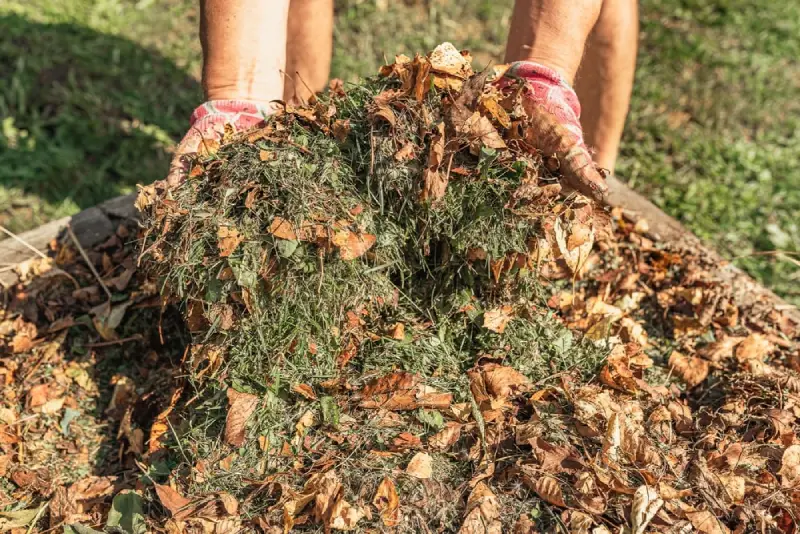
Pros: They're free and great at enriching the soil, retaining moisture, and protecting your plants during the cold winter.
Cons: Damp leaves may mat and rot.
How to Apply Mulch to Trees
If you plan to mulch trees, it's essential to learn proper application. Over-mulching trees cause death to many popular tree varieties, including dogwood, ash, birch, cherry, and spruce trees. But when you learn the appropriate time, location, and proper techniques, your trees will reap the benefits.
The following are tips you can use to apply mulch around trees:
- Apply mulch out, not up.
- Apply less mulch if the soil drains poorly. (A finely textured mulch works great.)
- Apply mulch away from the tree trunk.
- Use organic mulch so the trees can take advantage of the benefits when the materials decompose.
- Make sure to keep the trunk dry.
- Keep the tree roots moist.
- For best results, apply mulch in the middle of spring when soil temperatures are warm enough for root growth to start.
Common Mistakes to Avoid When Mulching Trees
It's easy to get carried away with applying tree mulch. However, you can avoid the following common mistakes when mulching trees:
Avoid volcano mulching. This common mistake occurs when a thick layer of mulch is piled up against the base of the trunk, covering the tree's bark and root flare.
Refrain from mixing tree mulch with soil. Mixing mulch with soil destroys the nutrient balance and complicates weeding and digging.
Stay away from mulches like hay from pastures or shredded brush. These materials may have weed seeds! This will lead to competition for water and soil nutrients.
Don't over-mulch. Applying too much mulch limits the oxygen supply and can kill trees.
Remove big weeds. Mulch won't magically make weeds disappear, so removing as many weeds as possible is wise.
The Benefits of Mulching Trees
Mulch gives your newly planted trees and the rest of the plants in your landscape the chance to thrive. And if you want your trees to grow faster, mulching trees properly can help!
The following is a recap of the benefits of tree mulch:
- Helps the soil retain moisture.
- Improves soil composition and provides additional nutrients for healthy growth.
- Disrupts the growth of weeds and grasses that are competing with the tree roots for water and nutrients.
- Prevents compacted soil by limiting heavy traffic (foot and vehicle), which helps roots breathe.
- Protects roots from extreme winter and summer temperatures.
When to Replace Mulch Around Trees
You should plan on mulching trees every year. Before applying new tree mulch, ensure the area is free of weeds, and avoid volcano mulching. It's also a good idea to leave a few inches between the base of your trees and buildings to avoid attracting insects and trapping moisture. You can keep mulch looking fresh by raking it every three to four months.
Of course, adding and maintaining mulch around trees can be time-consuming work. If you want healthy trees but would rather spend your time doing something else, leave the work to the professionals instead. They know how to mulch around trees and understand what’s required to keep them healthy. Then, you could relax and enjoy your free time. The Grounds Guys can help with all your tree mulching needs. And our Neighbourly Done Right Promise guarantees the job will be done right. We’re happy to provide free estimates and answer any questions you have about tree mulch. Contact us today!